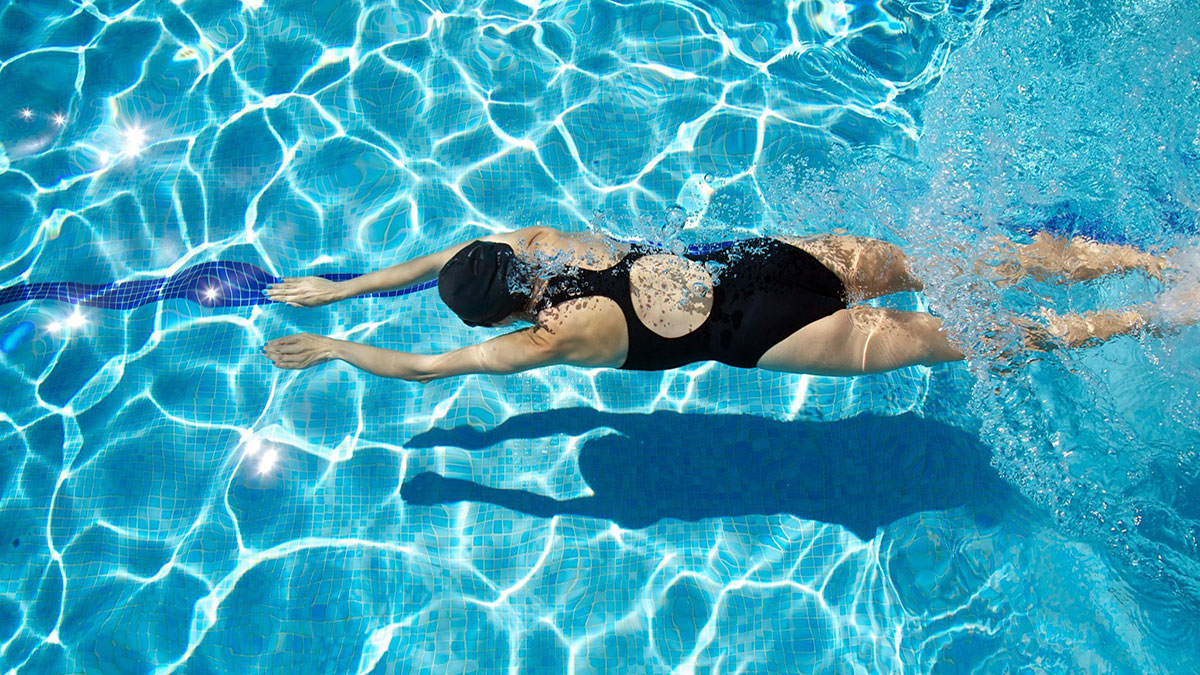The Best Exercise
Swimming just might be the best exercise out there. Here’s why.
Experts detail the benefits of swimming, from strengthening your muscles to reducing inflammation and boosting your mental health—and how to get started.

Swimming offers a low-impact exercise with numerous benefits from the health of your muscles and joints to the function of your heart and lungs.
PHOTOGRAPH BY HEATHER PERRY, NAT GEO IMAGE COLLECTION
While most people appreciate the health advantages that come from running, cycling, or lifting weights, fewer people understand the benefits that come from a good swim, which include muscle toning and strengthening, reduced inflammation, and boosted heart, lung, and mental health.
As it turns out, propelling one's body mass through water activates numerous systems throughout the body and makes the low-impact, high-results nature of the sport second to none. It also explains why Americans make more than 300 million recreational swimming visits a year, resulting in swimming being the fourth most popular recreational activity in the country, per data from the U.S. Centers for Disease Control and Prevention.
"Swimming provides an array of specific benefits such as improved cardiovascular and respiratory fitness, improved muscle strength and endurance, improved lean body mass, lower risk of traumatic injuries such as occurs during high-impact activities, and improved mental health and well-being," says Mitch Lomax, a pulmonologist and exercise physiologist at the University of Portsmouth in the United Kingdom.
The sport has the added advantage of being available to people of all ages and among those with physical limitations - individuals for whom activities like running or cycling could be more challenging.
"Swimming is an activity that can be performed across the age and ability spectrum that exists in other sports," says Lori Sherlock, an exercise physiology professor, Ironman challenger, and aquatic therapy coordinator at West Virginia University School of Medicine.
Good for the heart
Arguably the most important benefit that comes from swimming is that it promotes heart health. Research shows that the practice also improves circulation and cardiovascular efficiency, so one's risk of heart attack and stroke diminishes.
"Swimming is a whole-body rhythmic and dynamic activity that raises your heart rate and reduces your blood pressure effectively," says Hirofumi Tanaka, co-author of multiple swimming-related studies and the director of the Cardiovascular Aging Research Laboratory at the University of Texas at Austin. Research shows it decreases blood pressure, in part, by reducing the hardening or stiffening of blood vessels and by lowering oxidative stress and inflammation levels throughout the body.
Swimming also impacts the relationship between your cardiovascular and respiratory systems as your lungs work harder to meet the demands of a climbing heart rate.
"The hydrostatic pressure of swimming in water paired with the increase in central blood volume, challenges the respiratory system and makes inhaling more challenging than when breathing on land," says Sherlock.
This process increases lung capacity and strengthens the cardiac muscle, "and significantly increases the efficiency of the cardiovascular system," says John Whyte, a practicing physician in Washington DC and the chief medical officer at WebMD.
Good for every muscle in the body
Swimming also has a tremendous impact on the musculoskeletal system as the viscosity and density of water provides resistance against each swim stroke, requiring the use and strengthening of muscles.
"To propel yourself forward, swimming requires the utilization of many major muscle groups of the body,” says Heather Massey, a senior lecturer and sports exercise scientist at the University of Portsmouth.
These include core muscles, hip flexors, neck muscles, arm, hand and shoulder muscles, chest and back muscles, plus glutes, and leg and feet muscles. "It’s probably safe to assume that if you can name a muscle, it's likely used at some point during swimming," says Lomax.
This unique form of water resistance has the added advantage of muscle strengthening and toning, "without the wear and tear associated with weightlifting," says Whyte.
It's also often seen as a plus that one can get more toned muscle without also dealing with the inconvenience of perspiration on one’s clothing and across one’s face, "which really deters some people from exercising more often," says Christopher Travers, an exercise physiologist at Cleveland Clinic in Ohio.
Studies show that swimming also increases range of motion, reduces joint pain, enhances flexibility, improves posture, and slows down the aging process. It's also been shown to help people with multiple sclerosis, and arthritis, and is good for blood glucose management.
Source
https://www.gomotionapp.com/team/cavaq/page/news/517413/swimming-just-might-be-the-best-exercise-out-there-heres-why
https://www.orlandohealth.com/content-hub/why-swimming-might-be-the-best-form-of-exercise-there-is/
https://www.usms.org/fitness-and-training/articles-and-videos/articles/why-swimming-might-be-the-best-form-of-exercise-you-can-do
https://www.mensjournal.com/health-fitness/why-swimming-is-one-of-the-best-and-hardest-workouts-you-can-do
https://health.clevelandclinic.org/swimming-joint-friendly-and-good-for-the-heart




































